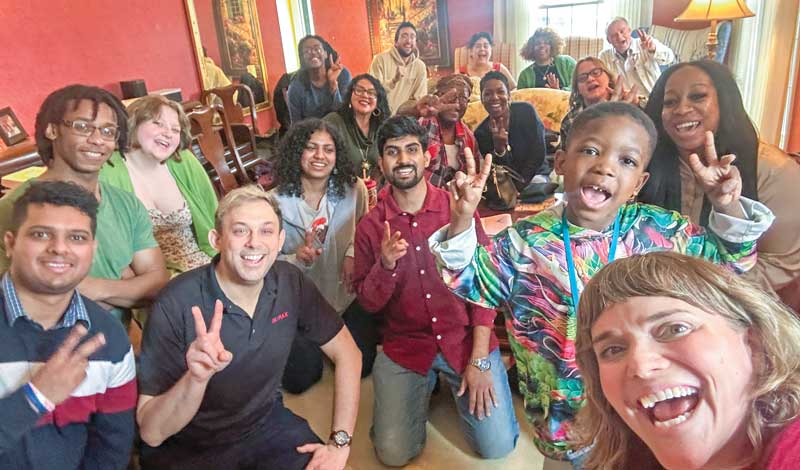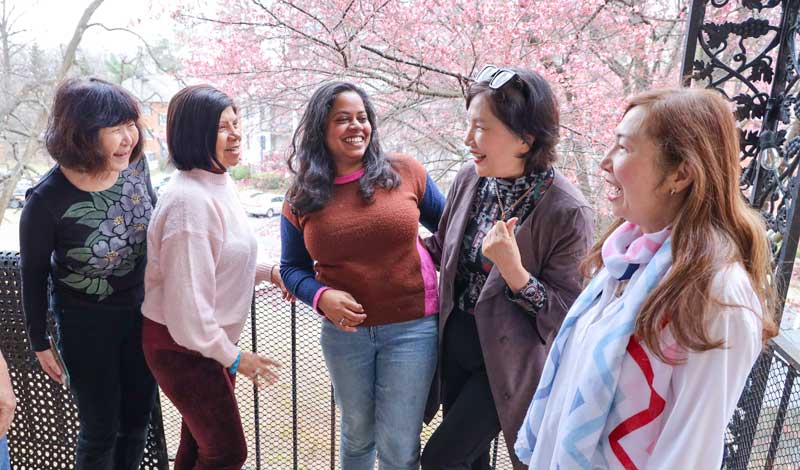Please base your monthly discussion meeting study on one of the following:
1) Buddhist Concepts (pp. 40–41)
2) Writings for Discussion Meetings (pp. 42–43)
3) Material from any recent issue of the World Tribune or Living Buddhism
Buddhist Concepts
Our Karma Is Our Mission: Voluntarily Assuming the Appropriate Karma
Have you ever turned down a great opportunity for wealth or success to go instead to a harsh place, for little pay, to help those in need? If not, no judgment—it’s uncommon, even for kind, generous people to do so.
But the Lotus Sutra speaks of bodhisattvas who set aside the fortune they’ve gained through pure-hearted Buddhist practice. Rather than being reborn into pure lands as Buddhas, free of worry, they choose to return to this suffering-filled world to teach the sutra and help others attain Buddhahood. In “The Teacher of the Law,” the sutra’s 10th chapter, Shakyamuni Buddha states:
You should understand that these people voluntarily relinquish the reward due them for their pure deeds and, in the time after I have passed into extinction, because they pity living beings, they are born in this evil world so they may broadly expound this sutra. (The Lotus Sutra and Its Opening and Closing Sutras, p. 200)
Nichiren Daishonin echoes this in “The Opening of the Eyes,” stating:
For instance, there are certain Hinayana bodhisattvas, not yet freed from delusion, who draw evil karma to themselves by their own compassionate vow. If they see that their father and mother have fallen into hell and are suffering greatly, they will deliberately create the appropriate karma in hopes that they too may fall into hell and share in and take their suffering upon themselves. Thus suffering is a joy to them. It is the same with me [in fulfilling the prophecies]. Though at present I must face trials that I can scarcely endure, I rejoice when I think that in the future I will escape being born into the evil paths. (The Writings of Nichiren Daishonin, vol. 1, p. 243)
The Buddhist concept of “voluntarily assuming the appropriate karma” is a translation of the phrase ganken ogo, the Japanese pronunciation of a Chinese term. Gan means “wish” or “will”; ken means “combined” or “concurrent”; and go means “action” or “karma.”
The concept arises from two Buddhist perspectives on why we are born into specific circumstances.
The first is “karmic birth”—our actions over many past lives create karma that determines our present circumstances.
The second is “wished-for birth”—we are born into our current conditions because of a vow made in a past life. Ken, or concurrent, suggests that while understanding our situation is a result of our karma, we can at the same time view it as something we wished for.
For us, this means we can see our lives, including our problems, as due in part to the vow we have made as bodhisattvas to demonstrate the power of the Lotus Sutra, of chanting Nam-myoho-renge-kyo. As a note, this doesn’t mean we must reject all benefits or opportunities from now on.
When we see our present struggles as something we choose to take on to show others the power of Buddhist practice, we can find renewed hope and confidence.
We may not know what we did in our past lives. But Buddhism teaches that the past, present and future all exist in this moment. How we view our lives now and how we act from this point on profoundly shape our future, and even the world’s future.
A modern expression of this idea is “changing karma into mission.” Ikeda Sensei wrote:
Instead of simply regarding their sufferings as the result of their negative karma, [Soka Gakkai members] choose to see them as problems they have voluntarily taken on to fulfill their mission, as challenges they have vowed to overcome through their Buddhist practice.
The teaching of voluntarily assuming the appropriate karma points to such a major transformation of our state of mind, our deep-seated attitude toward life. To live with the resolve to change karma into mission is the essence of transforming one’s karma or destiny. (A Religion of Human Revolution, p. 98)
Changing our karma into our mission means seeing our hardships not as a karmic reckoning of past actions but as opportunities to fulfill a greater purpose. How we face and overcome our sufferings can become a source of strength and inspiration for others. By choosing to use our struggles to help others awaken to their potential, we not only change our destiny but contribute to a brighter future for all humanity.
—Prepared by the SGI-USA Study Department

Writings for Discussion Meetings
Gathering Fortune From Ten Thousand Miles Away
Passage
The sincerity of making offerings to the Lotus Sutra at the beginning of the New Year is like cherry blossoms blooming from trees, a lotus unfolding in a pond, sandalwood leaves unfurling on the Snow Mountains, or the moon beginning to rise. … It is clear that those who now believe in the Lotus Sutra will gather fortune from ten thousand miles away.
—“New Year’s Gosho,” The Writings of Nichiren Daishonin, vol. 1, p. 1137
Background
In our Buddhist practice, we focus on making good causes to build genuinely happy lives. Yet, we might at times doubt that our efforts will bring positive results.
However, Nichiren Daishonin affirms in the “New Year’s Gosho” that those who make sincere offerings to the Lotus Sutra will amass immeasurable good fortune and absolute happiness.
In Buddhism, the practice of making offerings (almsgiving) includes the offering of goods, such as food, money and other items, and the offering of the Law, or spreading Buddhism.
This letter was most likely sent in 1281 to the wife of Omosu, an elder sister of Nanjo Tokimitsu. A few years earlier, in 1278, she had lost her daughter, who had often sent letters to Nichiren. In a letter her daughter wrote to him just before her passing, she expressed admirable resolve in the face of death. Perhaps in tribute to her daughter’s spirit and to express her own resolve, the wife of Omosu sent Nichiren offerings of steamed rice cakes and fruits at the year’s start.
In this letter, Nichiren explains that both Buddhahood and hell exist within us. A person filled with hatred dwells in hell, while a person with faith in Nam-myoho-renge-kyo experiences Buddhahood. With the law of cause and effect operating deeply in life, Nichiren assures the wife of Omosu that her sincere efforts will bring flowers of fortune and happiness.
In the SGI, May 3, Soka Gakkai Day, is our New Year’s Day. It is a time to renew our resolve to make earnest efforts in our Buddhist practice and bring “fortune from ten thousand miles away”!
—Prepared by the SGI-USA Study Department
Ikeda Sensei’s Encouragement
Those Embracing the Mystic Law Are Sure to Become Happy
Nichiren Daishonin declares: “Those who now believe in the Lotus Sutra will gather fortune from ten thousand miles away.” Here, he assures us that when we believe in the Lotus Sutra (the Gohonzon) and live out our lives to the best of our ability, we are certain to become happy. We will never sink into misery but attain happiness without fail. No matter what our present situation, no matter how things have been in our lives until now, if we persevere earnestly in faith we will enjoy unsurpassed good fortune and benefit beyond measure and lead lives of deep fulfillment.
“Those who now believe in the Lotus Sutra” means those who bring forth the world of Buddhahood inherent in their “five-foot body” and “in their heart.” Such people have entered the great path of attaining Buddhahood in this lifetime. With their lives shining like the noblest of Buddhas, they can never be unhappy.
We ourselves embody happiness. No one can take that happiness away. No one can destroy it. As practitioners of the Mystic Law, we possess an incredibly strong “magnet” that attracts good fortune and happiness. That is why the heavenly deities and the Buddhas and bodhisattvas of the ten directions and three existences gather around to protect us.
With the most powerful life force, one can stand surrounded by good fortune and dwell at ease in a beautiful “magnificent palace” of happiness. Such happiness is not self-centered. Rather, it is an inexhaustible happiness, happiness that can embrace both oneself and others. (The Teachings for Victory, vol. 6, p. 65)
You are reading {{ meterCount }} of {{ meterMax }} free premium articles

